Success at Top STEM Schools
Considering a competitive STEM college, like UC Berkeley? If so, you may be curious to hear the perspective from a professor on campus! Learn more about success at top STEM schools and careers through firsthand examples.
In the informational webinar Empowerly hosted with Dr. Yang, Sarah was able to ask many of your most frequent questions. Following, audience members were also able to submit questions. From artificial intelligence to following your passions, we cover a lot of ground. Read on for the full scoop.
Right off the bat, Dr. Yang made it clear that driven STEM students can succeed at a wide variety of different universities. So if UC Berkeley isn’t on your top STEM schools list, that’s okay! He advises that any student take the opportunity that is available, and follow the path where you think you will succeed.
Second, he emphasizes that every student’s experience will be unique. So while he can offer his personal perspective, it won’t be a one-size-fits-all “blanket statement.” Instead, he can answer individual questions as best he can to give a more full picture of the potential experience.
We at Empowerly couldn’t agree more!
Background on Dr. Yang
Next, let’s discuss how Dr. Yang got to where he is now. Among other highly respectable commendations, in his career, he has:
- Earned his BE degree in Computer Science at the University of Technology in China
- Earned his dual MS degree in Mathematics and Electrical Engineering and his PhD degree in Electrical and Computer Engineering at the University of Illinois, Urbana Champaign
- Now, engaged in research and teaching at the University of California, Berkeley
- Executive Director of the FHL Vive Center for Enhanced Reality
- Former Chief Scientist of the Fung Institute
- And more!
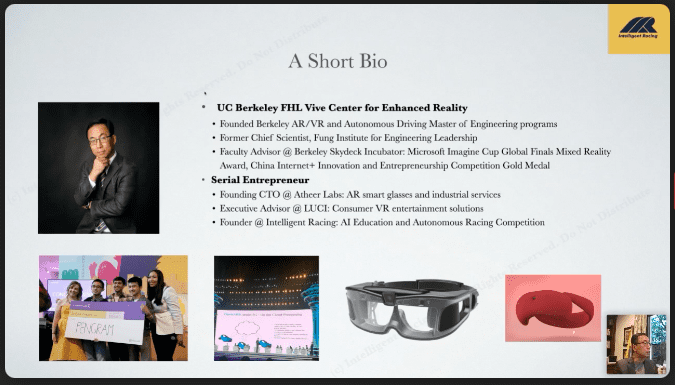
In addition to attending some of the top STEM schools in the world, he engages in hands-on work. He works in augmented reality and virtual reality, and the potential applications for this technology in the future. He actually founded the AR/VR degree program, among other cutting edge educational developments.
In regards to projects, Dr. Yang has worked on Augmented Reality glasses (in grey, image above), as well as Virtual Reality consumer-facing entertainment devices (in red, image above), both to great success.
About Dr. Yang’s Current Work:
Dr. Yang truly understands that AI is important. However, that doesn’t necessarily mean only Siri and Alexa. Instead, he believes that applying these technologies to the field of transportation holds a well of untapped potential to change human society in major ways. The sample video he shared of a driving code features a shiny red Tesla, a brand name many will recognize. Tesla is an example of how transportation technology is already changing the world.
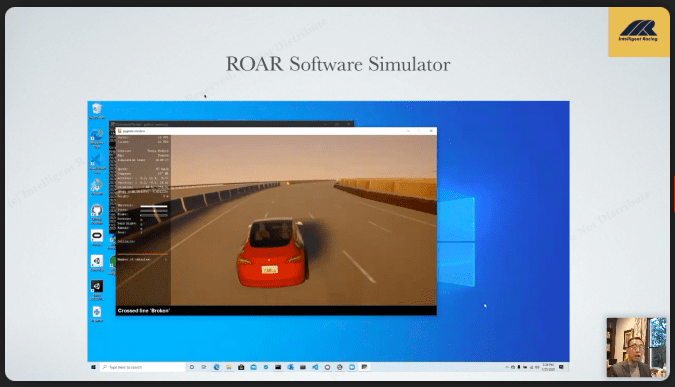
Dr. Yang focuses on this impactful work through the Berkeley Robot Open Autonomous Racing program (known as ROAR). He finds this work very exciting, and many students who pursue this work as well would agree. This field offers a practical mix of hands-on hardware engineering alongside pure software development and testing, all in one. From cutting carbon fiber plates to designing the driving commands, there’s something for everyone.
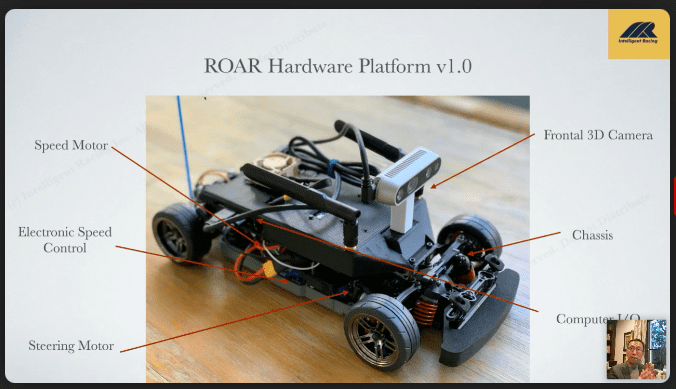
Best of all, research and work on remote driving technologies like this can be continued from afar during the pandemic! Both Berkeley students and those off-campus who are highly motivated to participate are welcomed to engage.
Advice for STEM Students Applying to College
As you may know, learning about computer programming can start very young. While Dr. Yang’s work on Berkeley’s campus primarily caters to college students, he has prepared a teaching platform specifically for K-12 students. This program is best for 9-12th graders, in particular. So if you are interested in starting learning now, from Python to algorithms, check it out. This program is called Intelligent Racing. (Empowerly students and families can claim a special discount on the tuition, so let us know if you’re interested.) Specifically, Dr. Yang describes this online crash course as like an extracurricular AP course.
If you are passionate about technology, find what you care about and find ways to be involved and start learning as soon as you can. Essentially, everyone starts somewhere.
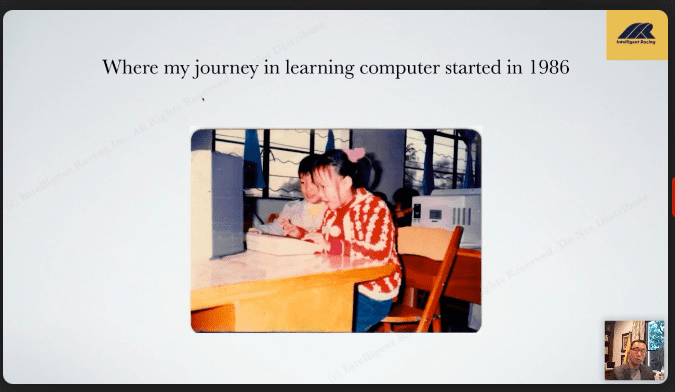
Parents, too, can encourage their students to pursue their interests, and support curiosity. Dr. Yang took his first steps into coding at the ripe old age of six!
Frequently Asked Questions
After graduation, should I apply for a PhD degree?
One of the major reasons why Berkeley is focusing on strengthening the Master’s program is the belief that technology develops at an exponential rate. (MA or MS is a shorter degree path). Taking 5-6 years to study in classrooms alone for a PhD means that you may miss a whole major development in the real world! Therefore, education must be innovative and adaptive. From there, it’s up to you.
How important is research in college? If it is important, how can younger students prepare for research at top STEM schools?
Yes, research is very important. It allows you to gain hands-on experience that will directly translate to potential career opportunities.
Walk the walk! If an admissions officer reads your application (or a research PI reads your request for a position) do your research on what they are looking for. Research how your work can benefit society. Learn about campus culture. Consider your motivations for studying and researching in the first place. Then, put all that consideration into your application to stand out.
What should I look for in top STEM schools to help me on my way?
An important aspect of any STEM education program is finding ways to get involved with the industry and stay relevant. This doesn’t mean only research, but the workforce as well. The Silicon Valley is a great place to stay in touch with developments in the field, if that is something you would like to pursue. No matter where you attend, consider the job and internship opportunities nearby. Stay curious!
How can I start preparing for internships and learning on my own, in high school?
Learn hard skills so that you can compete for competitive positions. Don’t expect things to be handed to you! Take initiative to teach and investigate what you would like to work on so you can hit the ground running. For example, practice and experiment with different coding languages, like Python!
Specialize in something useful. As Dr. Yang says, “there’s a difference between speaking English and writing a book,” and it’s the same for coding! Take some time to really strengthen your application by gaining a unique understanding of a few critical skills, above and beyond your peers.
If I want to learn about computer programming and not pursue an Electrical Engineering or Computer Science degree, what else can I do?
There are a lot of options for degrees you can immerse yourself in. This is especially true at well-equipped top STEM schools. You can pursue machine learning, chip manufacturing and design, or more. You don’t need to enroll in one particular major to do so, as long as you are learning the right skills.
On the other hand, you can take your programming learning into seemingly unrelated fields, like finance, bioengineering, space, and more! AI will find new applications in human society all the time. Gaining knowledge coding will take you very far, even if you don’t want to go straight into a traditional Electrical Engineering or Coding career.
Looking for Ways to Get Involved?
More information and links for the Intelligent Racing Program can be found here. If you’re interested in developing exciting hardware or software related to autonomous driving via algorithms, this is a unique opportunity to get involved.
If you do feel prepared by this program, you can even enter and compete in the annual ROAR competition for winning autonomous driving teams! The track is placed on UC Berkeley’s campus, but you can submit your code from anywhere if you want to enter. Plus, if you win in a particular category (as a high school or college student) you can even feature your explanations on the Berkeley website. Dr. Yang describes this as “your very first TED talk,” which should resonate with any life-long learners out there!
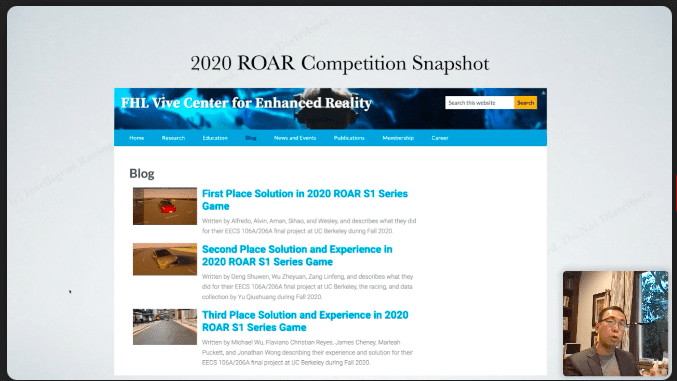
If that isn’t your speed quite yet, there are other options. Dr. Yang discussed a creative solution by the UC Berkeley graduating class of 2018, who weren’t able to walk in person due to the COVID-19 pandemic. Instead, several students got together and created (and hosted) an entire campus graduation ceremony in the game Minecraft (pictured below). In the end, finding ways to channel your passion and creativity with the tools available is key.
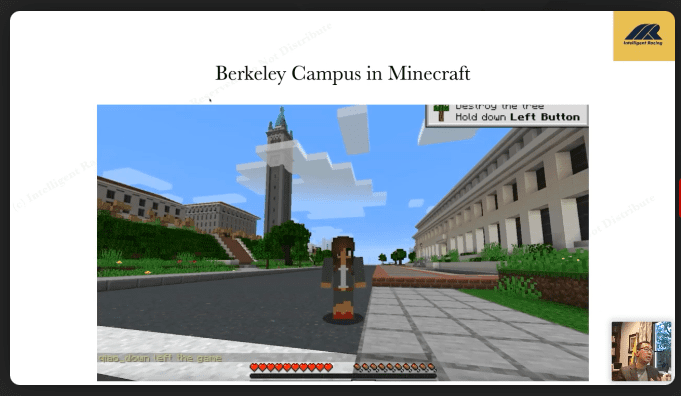
Looking for more guidance? Stay tuned for more great webinar content in the future! To get started today, book a consult with an Empowerly team member to learn more about how to develop your applications for success at top STEM schools. We have many counselors with experience at UC Berkeley and similar universities. Talk with us about summer program options, how to get involved with the Intelligent Racing program, and more. We can’t wait to meet you!



